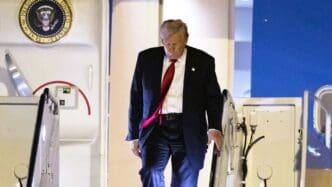Executive Summary
The Story So Far
Why This Matters
Who Thinks What?
An recent analysis posits that the United States must uphold its global leadership position amidst an “unprecedented assault” on the U.S.-led world order by a burgeoning “alliance of autocrats” comprising nations like China, Russia, Iran, and North Korea. The article, published 24 years after the 9/11 attacks, contends that despite America’s military and economic strength, its global influence is being actively challenged, with countries such as India reportedly aligning with this anti-Western bloc. It further examines President Trump’s foreign policy decisions, noting both their strengths and weaknesses in navigating this shifting international landscape.
The Shifting Global Landscape
The article highlights a perceived “alliance of autocrats” formed by China, Russia, Iran, and North Korea, which it argues is actively working to dismantle the existing U.S.-led world order. This bloc’s influence is reportedly expanding, with India’s leadership recently joining discussions in Beijing, signaling a potential threat to American dominance.
According to the analysis, this strategic shift necessitates a re-evaluation of U.S. foreign policy. The author emphasizes that while the U.S. remains the world’s dominant power, a retreat from its global role could lead to increased international insecurity.
President Trump’s Foreign Policy: A Mixed Record
The article credits President Trump for demonstrating U.S. global leadership in several areas. He is lauded for strengthening NATO by committing to Article V and securing significant increases in allied defense spending, reinforcing the alliance’s collective security framework.
Trump’s administration also garnered praise for its strong support for Israel’s conflict with Hamas, ordering military strikes against Iran, and taking a more aggressive stance against Venezuelan leader Nicolas Maduro. The analysis suggests that his decisive action against Iran surpassed previous administrations’ diplomatic approaches, which it argues allowed Iran to advance towards nuclear capability.
Despite occasional overtures to Russian President Vladimir Putin and pressure from his base, President Trump maintained aid to Ukraine, avoiding demands for its capitulation. His earlier discussions about annexing Canada and Greenland did not materialize, further contributing to a complex foreign policy profile.
Critiques of the Transactional Approach
However, the analysis also criticizes President Trump’s transactional foreign policy, stating it often created dangerous uncertainty rather than desired outcomes. It points to delayed sanctions against Russia, which the author argues prolonged the conflict and eroded U.S. credibility.
The article further contends that imposing unilateral, often punitive, sanctions and issuing harsh public criticism against the European Union and India pushed these allies closer to Beijing and Moscow. This approach, it argues, undermined efforts to form a united front against China and Russia.
Erratic trade policies, particularly those directed at allies, are highlighted as corrosive to international relationships. The analysis cites Brazil, a key U.S. trade partner, being pushed towards China due to tariffs imposed by Trump over perceived poor treatment of former President Jair Bolsonaro.
Towards an Effective 21st-Century Foreign Policy
The article proposes that an effective foreign policy must acknowledge that “America First” does not equate to “America only.” It argues that U.S. retreat from global engagement provides an opening for autocrats, potentially leading to larger conflicts that eventually require American intervention.
It suggests that while the U.S. may not serve as the world’s “cop” in minor conflicts, it should firmly oppose countries using force to subjugate their neighbors. Crucially, the analysis advocates for a foreign policy rooted in collaboration with allies, emphasizing that the U.S. is stronger when it works in concert with international partners.
The author argues that while demanding allies like Europe and NATO share more of the defense burden is positive, its impact is diluted if allies question U.S. commitment. It uses India as an example, suggesting that punitive sanctions pushed New Delhi away when its cooperation was most needed against China and Russia.
Upholding the U.S.-Led World Order
The analysis concludes that strong American leadership, which established the most peaceful and prosperous era since World War II, is essential to protect this legacy and the U.S.-led world order. It suggests that President Trump can provide this decisive leadership by working with allies, strengthening relationships, and establishing clear “red lines” for adversaries in Asia, Europe, and the Middle East.
Ultimately, the article asserts that America’s allies should feel secure in U.S. commitments, while its adversaries should remain uncertain about the timing or methods of U.S. action, but never about its core principles or resolve to defend them.








